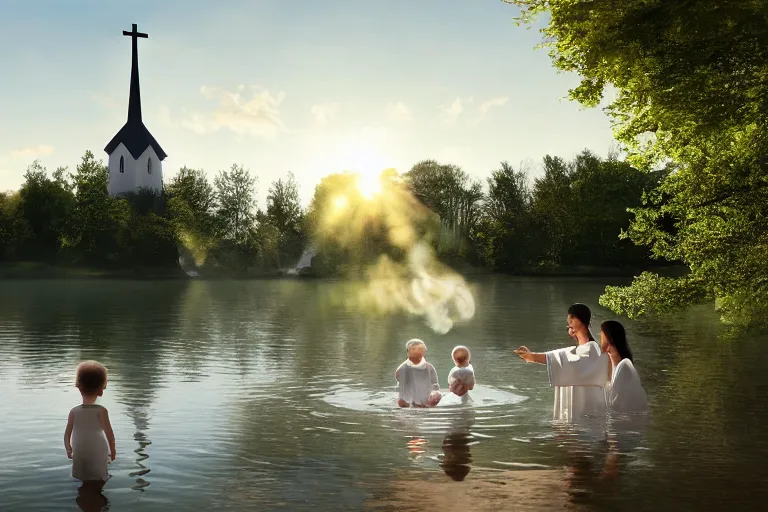Exploring the reasons behind infant and adult baptisms within Christianity
Dive into the fascinating world of Christian baptism, where we’ll explore why some individuals are baptized as infants while others wait until adulthood. This article will delve deep into the history, beliefs, and practices surrounding these two distinct paths to baptism.
The History of Christian Baptism
Imagine dipping into the waters of baptism as a means to enter the community, just like joining a family through marriage or adoption—each step is a profound symbol of welcoming someone new into a shared life and faith. But when did this practice begin, and why do some choose to baptize infants while others wait until adulthood?
The history of Christian baptism can be traced back to the New Testament, where it is mentioned as an act of initiation into the community of believers. Early Christians saw baptism as a ritual that symbolized washing away sin and being reborn in Christ, much like how seeds need to be planted and watered before they can grow. But as Christianity spread, different interpretations emerged regarding who should be baptized and when.
One of the key questions that arises is: Why do some churches baptize infants, while others wait until a person reaches adulthood? The answer lies in historical developments and theological debates within the Christian tradition. Infant baptism has its roots in the belief that faith can be passed down to children through the family, just as they inherit physical traits.
However, this practice faced challenges over time. Some argued that infants cannot make a conscious decision for faith; hence, baptism should wait until individuals are old enough to understand and accept their Christian beliefs fully. This perspective led to what we now recognize as baptism of believers, focusing on adult candidates who can articulate their faith.
Both practices have their roots deeply embedded in the rich tapestry of Christian history, each offering a unique path towards spiritual growth and understanding. Whether through the eyes of a child or the mind of an adult, baptism remains a profound moment that transforms one’s life, marking the beginning of a lifelong journey with Christ.
Now, as we delve into the reasons behind infant baptism, let us explore how this tradition has been shaped by faith and tradition, making it a significant part of many Christian communities.
Infant Baptism: A Tradition Rooted in Faith
Infant baptism, often seen as a traditional practice rooted deeply within Christian communities, raises intriguing questions about faith and tradition. Why do many churches baptize babies when they are still too young to understand the significance of this ceremony? Is it not a bit like planting seeds in soil that hasn’t yet sprouted?
Theologians often see infant baptism as a continuation of God’s grace, extending even before a child can comprehend. It’s like planting those seeds early because they are believed to grow into faith over time. But what if these tiny infants will not live long enough for their faith to bloom? How do we reconcile such an early commitment with the adult understanding and conscious decision-making that many believe baptism should represent?
Practically, infant baptism provides a sense of community continuity and marks a child’s entry into the church family. It’s like welcoming a new member into your home, complete with all the rituals and customs. But isn’t there something fundamentally different about baptizing someone who has no choice or understanding compared to an adult who makes a conscious decision?
Many argue that baptism symbolizes a covenant between God and the individual believer. If this is so, how does it apply when the individual can’t make sense of what’s happening? Is infant baptism then merely a formality, or does it carry a deeper meaning that transcends immediate comprehension?
In exploring these questions, we delve into the heart of what it means to be Christian and the role of baptism in one’s spiritual journey. It’s a complex tapestry woven from faith, tradition, and personal belief. As we ponder the reasons behind infant baptism, we are left with more than just answers; we find new layers of understanding about this ancient practice.
The Development of Adult Baptism
The Development of Adult Baptism: Examine the evolution of adult baptism, discussing its origins, growth, and significance within various Christian traditions.
Have you ever wondered why some Christians choose to wait until adulthood before they are baptized? Why did this practice develop over time, and what makes it so significant in their lives?
In many early Christian communities, baptism was often seen as a symbolic act, signifying the death of one’s old self and the rebirth into new life with Christ. Initially, infant baptism became more prevalent due to practical considerations and theological developments within certain traditions. However, the journey of adult baptism is a unique path that carries its own rich history and profound meaning.
Some early Christian thinkers and leaders, like The Didache, recognized the importance of personal commitment in the decision to be baptized. They saw it as an act of self-determination, where one chooses to follow Christ fully based on a life of faith, knowledge, and understanding. This perspective highlighted the adult’s ability to make informed decisions about their spiritual journey.
- Significance: For adults who were baptized later in life, this process often involved a deeper exploration of Christian teachings and a commitment to living out one’s faith through actions and community service.
- Growth: The development of adult baptism can be seen as an acknowledgment that spiritual maturity is not always synonymous with age. It allowed for individuals to engage more deeply with their faith and understand the implications of their baptismal vows.
In many traditions, such as Baptism, Anabaptist, and some branches of Protestantism, adult baptism remains a central practice. These communities value the personal decision and commitment that comes with this choice, often incorporating elements like catechumenate periods where adults prepare for baptism through study and reflection.
Reflect on your own journey. When did you first consider what faith meant to you? And if you were baptized as an adult, how did that moment change your understanding of your role in the church?
Baptismal Theology: Key Beliefs and Teachings
Understanding the Differences in Christian Baptism: Babies vs. Adults
Baptism, a sacred rite that symbolizes a person’s entrance into the Christian faith, comes in two primary forms within Christianity: infant baptism and adult baptism. But why do these two practices exist? Could it be as simple as convenience or as profound as theological belief?
One might wonder, are infants truly capable of understanding the sacrament they undergo, or is their baptism a symbolic act for the faith commitment of their parents or guardians? In many traditions, infant baptism (catechumen baptism) is seen as an expression of God’s grace before one can fully comprehend the gospel. It’s like planting a seed in fertile soil; even if it hasn’t sprouted yet, the potential for growth is present.
On the other hand, adult baptism (often referred to as baptism of believers) stands as a testament to personal belief and commitment. It requires an individual’s active decision, much like choosing to take a journey with a new companion—every step must be deliberate and chosen freely.
So, is it more meaningful to enter the faith through your own volition or to be guided by those who love you? Both practices have deep theological roots. Infant baptism emphasizes God’s unconditional grace and the possibility of spiritual life even before conscious understanding. Adult baptism, on the other hand, underscores personal commitment and freedom in choosing one’s belief system.
Both forms of baptism are intertwined with broader Christian teachings about salvation, faith, and the role of water as a symbol of purification and new life. They offer different paths to the same destination—a deeper understanding of God’s love and a journey of spiritual growth.
Practical Considerations: Choosing Between Infant and Adult Baptism
When considering baptism, Christians often find themselves at a crossroads, wondering whether to follow the path laid out by their family traditions or to make a personal choice that aligns more closely with their beliefs. Should you be baptized as an infant, or wait until adulthood?
Personal beliefs play a significant role in this decision. Some argue that baptism should be a conscious choice made when one understands the faith, emphasizing the importance of voluntary commitment. Others see it as a spiritual milestone that should be celebrated early in life, mirroring the early Christian practice of baptizing infants and their families.
Family traditions can also influence this choice. In some families, baptism is seen as a rite of passage passed down through generations, symbolizing continuity and faith. However, other families might view it more as an individual decision that should be guided by personal spiritual growth rather than family expectations.
Cultural influences add another layer to the mix. In certain cultures, infant baptism might be deeply rooted in tradition and community practices, while in others, adult baptism could carry a sense of personal identity and autonomy. These cultural contexts shape how individuals perceive their own spiritual journey and the role of baptism within it.
Ultimately, the choice between infant and adult baptism comes down to weighing these practical considerations against one’s own spiritual convictions. It’s a deeply personal decision that requires reflection on what baptism means in your life—a metaphorical rebirth or a sign of commitment—before making a meaningful choice.
No matter the path chosen, each individual’s journey is unique, much like a river flowing through different landscapes. The important thing is to embrace the spiritual waters that guide you toward your faith, whether they start early in life or later on.
A Global Perspective: Regional Differences in Christian Baptism
Imagine standing at the edge of a river, looking out over its gentle flow, contemplating whether to jump into its waters as a baby or wait until adulthood. The decision can seem monumental, yet it’s deeply rooted in regional and cultural contexts within Christianity.
Why does geography play such a significant role? Consider the lennox, a sacred river in England where infant baptisms have been performed for centuries. The lush greenery and rolling hills make it not just a geographical location but a spiritual one, where the community gathers to celebrate new life with water and prayer.
In contrast, observe the African continent’s diverse practices. In some regions, adult baptism is seen as a transformative event, marking a personal commitment to faith. Here, the act of immersion in natural bodies of water often symbolizes a rebirth into a community that values individual spiritual journeys over communal traditions.
Cultural influences also shape these regional variations. Take Japan’s unique approach, where Christian communities have adapted their practices to fit local customs, blending Western rituals with Eastern philosophies. Here, the emphasis might be more on personal reflection and introspection, reflecting a balance between Western and Eastern spiritualities.
In Latin America, the influence of Catholicism is profound, yet there’s also a strong presence of Protestant denominations that vary widely in their baptismal practices. In some areas, infant baptisms are more common due to traditions passed down through generations, while other communities prefer adult baptism as a clear statement of personal faith and commitment.
These regional differences highlight the dynamic nature of Christian practice, where geographical and cultural factors intertwine with religious beliefs to shape the rituals around baptism. Whether you’re in England or Japan, each region’s approach to baptism reflects its unique identity, making the decision between infant and adult baptism a profoundly personal one.
Conclusion
 By the end of this article, you’ll have a comprehensive understanding of the various reasons behind infant and adult baptisms in Christianity. You’ll also gain insights into the unique perspectives and traditions that shape each practice.
By the end of this article, you’ll have a comprehensive understanding of the various reasons behind infant and adult baptisms in Christianity. You’ll also gain insights into the unique perspectives and traditions that shape each practice.











